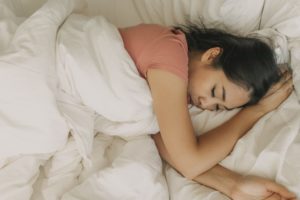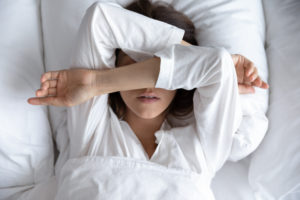When you buy through our links, we may earn a commission. Products or services may be offered by an affiliated entity. Learn more.
Why Am I So Tired?
It is normal to feel tired after a night of poor sleep, but for 10% to 25% of people, tiredness is an ongoing problem. Chronic fatigue or sleepiness may result from stress, physical or mental health conditions, consistently not sleeping well, or the side effects of medications. Sometimes these factors are easy to identify, while at other times the cause is more difficult to pinpoint, as in the case of a sleep disorder.
Sleep and health both affect each other. While many health conditions can cause poor sleep, poor sleep can also contribute to physical and mental health conditions. People who wonder why they are so tired should see a doctor, who can help identify an underlying disorder and start treatment if needed.
Looking to improve your sleep? Try upgrading your mattress.
Lack of Quality Sleep
Many people sacrifice sleep to meet work or social requirements, which can lead to feeling tired the next day. In particular, shift workers who work unusual hours may have trouble sleeping when needed.
Allotting more time for sleep, keeping regular bedtimes, and improving sleep habits may help restore healthy sleep patterns .
Sleep Disorders
Sleep disorders such as sleep apnea, restless legs syndrome, or delayed sleep-wake phase disorder can directly affect sleep quantity or quality, causing excessive sleepiness during waking hours. Insomnia, which involves trouble falling or staying asleep, can also cause fatigue.
A sleep disorder called hypersomnia causes people to feel extremely sleepy, even when they get enough sleep, to the point that it affects their day-to-day lives. While hypersomnia may occur due to a medication or a health condition, it can also occur for no apparent reason, in which case doctors may diagnose idiopathic hypersomnia.
If a person’s tiredness is due to a sleep disorder, doctors try to treat the disorder, which can lessen the sleepiness. For example, treating obstructive sleep apnea with continuous positive airway pressure (CPAP), or treating restless legs syndrome or narcolepsy with medication, can also improve the sleepiness that results from these conditions.
Stress and Mental Health Conditions
Work and family pressures, caregiving for a loved one, and other stressors can all affect sleep. A therapist can provide guidance for managing long-term stress, while fatigue from a short-term stressor often resolves once the stressor goes away .
Mental health conditions, in particular anxiety and depression, can lead to excessive sleepiness and longer-than-average nighttime sleep or napping. When a person feels tired due to a mental illness, doctors first treat the condition, with the aim that the fatigue will improve as well.
Chronic Health Conditions
Many chronic health conditions can make a person feel tired often. One of the most notable is chronic fatigue syndrome, also called myalgic encephalomyelitis (CFS/ME). Chronic fatigue syndrome affects various bodily systems, causing poor sleep and severe fatigue that persists even when the person is at rest.
Other health conditions that may cause tiredness include:
- Neurological disorders such as multiple sclerosis or Parkinson’s disease
- Certain genetic disorders
- Metabolic conditions, such as thyroid conditions, obesity, diabetes, liver or kidney disease
- Chronic pain
- Short-term or chronic infections
- Long COVID
- Fibromyalgia
- Anemia
- Some auto-immune disorders, like lupus or rheumatoid arthritis
- Cancer and cancer treatment
- Heart or lung disease
- Recovery from surgery
If a medical condition is causing fatigue, then the first line of treatment involves treating that condition. Sometimes fatigue improves as the condition improves. Other times, the health care team may have to conduct more tests.
Medications
Sleepiness is a potential side effect of many medications, including antihistamines, certain types of antidepressants, antipsychotics, benzodiazepines, anticonvulsants, and opioid painkillers. A doctor can advise people about safe and effective ways to minimize medication side effects.
Alcohol, caffeine, and certain illegal drugs may also contribute to fatigue. People may also feel sleepier than usual for a short period after they stop taking stimulants.
Diet and Exercise
Not drinking enough fluids can cause dehydration, leading to fatigue and other symptoms such as thirst and a dry mouth. In many cases, these symptoms resolve after restoring fluid levels . Eating a healthy, balanced diet can also help keep energy levels up.
Regular exercise is also important to stay healthy. For people with unexplained fatigue, starting an exercise program under the guidance of a health care professional may help improve energy levels. That said, getting too much exercise can also cause fatigue, in which case resting for a week or two can often help the person feel better.
When to Talk to Your Doctor
Talk to your doctor if you think you are sleeping enough, but you still feel tired often during the day, or if you feel tired due to a known medication or medical condition.
“Feeling tired all the time can be like experiencing perpetual jet lag. Your doctor can help you achieve the benefits of healthier sleep.”
Dr. Pranshu Adavadkar, Sleep Physician
Your doctor may ask questions about the nature of your tiredness and what medications you are taking. They may also ask for details about your sleep habits, and they may ask you to keep a sleep diary for one to two weeks.
Tell your doctor if you have symptoms of sleep disorders, such as loud snoring or an urge to move your legs when lying down. Also, share any other symptoms you have, even if they do not appear to be directly related. For example, tell your doctor if you have been feeling depressed, have trouble concentrating, or have recently lost weight for no identifiable reason.
As they search for the cause of your excessive sleepiness, your doctor may conduct further tests or give you questionnaires to screen for specific conditions. They may also want the input of someone close to you, like a family member. If they suspect a sleep disorder, they may refer you for testing in a sleep laboratory.
After reaching a diagnosis, the doctor can start appropriate treatment. This may include medications, CPAP therapy, behavioral therapy, or a managed exercise plan.
To reduce your risk of accidents , remember to avoid driving or performing other potentially dangerous activities if you are sleepy.
Getting Better Sleep
While it is important to treat any underlying conditions that are causing fatigue, there are also many ways to improve sleep on an ongoing basis.
- Invest in a good mattress: Most people sleep better when using a comfortable mattress and pillow that are well-suited to their body type and sleeping style. Your sleep setup may be especially important if you live with chronic pain.
- Improve sleep hygiene: Sleep hygiene encompasses all the habits that affect sleep. Good sleep hygiene practices include keeping regular bedtimes, avoiding caffeine and alcohol before bed, turning off electronic devices, and maintaining a cool, dark, and quiet bedroom.
- Consider therapy:Cognitive behavioral therapy for insomnia (CBT-I) is the first line of treatment for insomnia and is highly effective. A therapist can also suggest relaxation techniques to relieve stress for bedtime.
- Consider a sleep aid: Many types of sleep aids are available by prescription or over the counter. Talk to your doctor about trying melatonin or other sleep aids, and consider adjusting your diet with foods that aid sleep.
- Nap strategically: If you work unusual shifts or are otherwise unable to sleep at night, you may benefit from adding naps to supplement your major sleep period. Your doctor can help you determine the best nap length and time of day to nap.

Still have questions? Ask our community!
Join our Sleep Care Community — a trusted hub of sleep health professionals, product specialists, and people just like you. Whether you need expert sleep advice for your insomnia or you’re searching for the perfect mattress, we’ve got you covered. Get personalized guidance from the experts who know sleep best.
References
5 Sources
-
Chervin, R. D. (2023, January 26). Approach to the patient with excessive daytime sleepiness. In T. E. Scammell (Ed.). UpToDate., Retrieved March 27, 2023, from
https://www.uptodate.com/contents/approach-to-the-patient-with-excessive-daytime-sleepiness -
Fosnocht, K. M. & Ende. J. (2021, May 21). Approach to the adult patient with fatigue. In J. G. Elmore (Ed.). UpToDate., Retrieved March 27, 2023, from
https://www.uptodate.com/contents/approach-to-the-adult-patient-with-fatigue -
MedlinePlus: National Library of Medicine (US). (2019, May 29). Dehydration., Retrieved March 27, 2023, from
https://medlineplus.gov/dehydration.html -
A.D.A.M. Medical Encyclopedia. (2022, August 15). Are you getting too much exercise?. MedlinePlus., Retrieved March 27, 2023, from
https://medlineplus.gov/ency/patientinstructions/000807.htm -
MedlinePlus: National Library of Medicine (US). (2017, April 26). Healthy sleep., Retrieved March 27, 2023, from
https://medlineplus.gov/healthysleep.html











